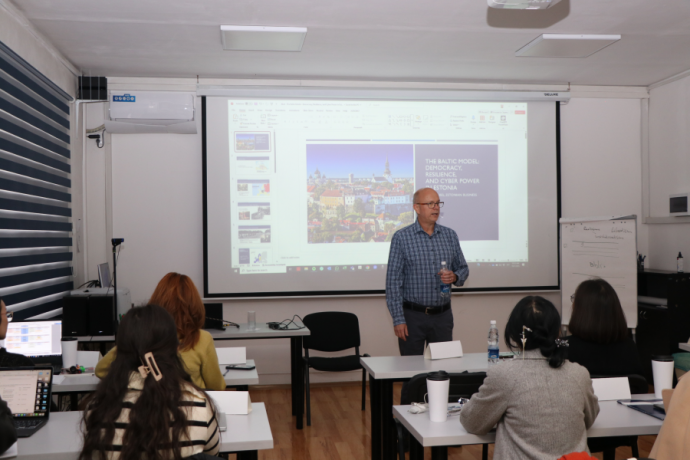News
OSCE Academy Welcomes Mr. Scott Abel for a Lecture on Estonia’s Democratic and Digital Evolution
On 1 October 2025, Mr. Scott Abel from the Estonian Business School held a guest lecture titled “The Baltic Model – Democracy, Resilience, and Cyber Power in Estonia”. The presentation provided an insightful overview of Mr. Abel’s experience in Estonia where he has been living for a quarter of a century. It extended to the 20th century history of the country, how it reinvented itself before the dissolution of the Soviet Union, and as an independent state thereafter. The presentation extended to the identity of Estonia and that of the Estonians, the country’s citizenship laws, the different approaches of various generations to the country’s recent past, including the still large non-Estonian ethnic community. Mr. Abel also shared his views and personal experiences concerning the so-called Bronze Night of 2007 when the removal of a Soviet historical monument in Tallinn and its relocation resulted in a large-scale Russian cyber-attack against Estonia. However, the country learned its lesson and developed a very effective cyber protection system. It is a leading country of the world in digital governance: The speaker presented the x-road system, the digital governance system that makes the life of Estonians easier on accessing state information about them, paying taxes, having access to services, etc. However, Mr. Abel also presented some of the current problems the country has been facing since the beginning of the high intensity war of Russia against Ukraine, including the severe consequences of economic sanctions, the collapse of trade with Russia, and also Russia’s transit trade through Estonian ports on the Baltic Sea. It was one of the consequences that Estonia had 19.4% inflation in 2022 that has been gradually reduced since.
The participants of the Politics and Security MA programme benefited significantly from learning about the highly successful transition and transformation of a small state during the last 35 years.
This is the second time Mr. Scott Abel visited OSCE Academy through the Horizon 2020 staff exchange project “MOCCA: Multilevel Orders of Corruption in Central Asia,” led by Lund University. As part of this collaboration, OSCE Academy serves as one of the Central Asian project partners.



 Русская версия
Русская версия